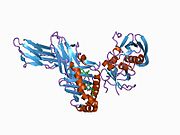HLA-DRB3
HLA class II histocompatibility antigen, DRB3-1 beta chain is a protein that in humans is encoded by the HLA-DRB3 gene.[2]
Function
The protein encoded by this gene belongs to the HLA class II beta chain paralogues. The class II molecule is a heterodimer consisting of an alpha (DRA) and a beta chain (DRB), both anchored in the membrane. It plays a central role in the immune system by presenting peptides derived from extracellular proteins. Class II molecules are expressed in antigen-presenting cells (APC: B lymphocytes, dendritic cells, macrophages).[2]
Gene structure and polymorphisms
The beta chain is approximately 26–28 kDa. It is encoded by 6 exons, exon one encodes the leader peptide, exons 2 and 3 encode the two extracellular domains, exon 4 encodes the transmembrane domain and exon 5 encodes the cytoplasmic tail. Within the DR molecule the beta chain contains all the polymorphisms specifying the peptide binding specificities. Typing for these polymorphisms is routinely done for bone marrow and kidney transplantation.[2]
Gene expression
DRB1 is expressed at a level five times higher than its paralogues DRB3, DRB4 and DRB5. DRB1 is present in all individuals. Allelic variants of DRB1 are linked with either none or one of the genes DRB3, DRB4 and DRB5. There are 4 related pseudogenes: DRB2, DRB6, DRB7, DRB8 and DRB9.[2]
See also
References
- ^ "Human PubMed Reference:". National Center for Biotechnology Information, U.S. National Library of Medicine.
- ^ a b c d "Entrez Gene: HLA-DRB3 major histocompatibility complex, class II, DR beta 3".
Further reading
- Germain RN (1996). "Binding domain regulation of MHC class II molecule assembly, trafficking, fate, and function". Semin. Immunol. 7 (6): 361–72. doi:10.1006/smim.1995.0041. PMID 8775462.
- Piatier-Tonneau D, Gastinel LN, Amblard F, et al. (1991). "Interaction of CD4 with HLA class II antigens and HIV gp120". Immunogenetics. 34 (2): 121–8. doi:10.1007/BF00211424. PMID 1869305. S2CID 10116507.
- Nong Y, Kandil O, Tobin EH, et al. (1991). "The HIV core protein p24 inhibits interferon-gamma-induced increase of HLA-DR and cytochrome b heavy chain mRNA levels in the human monocyte-like cell line THP1". Cell. Immunol. 132 (1): 10–6. doi:10.1016/0008-8749(91)90002-S. PMID 1905983.
- Ress SR, Rousseau J, Ratanjee B, et al. (1991). "HLA class II induction by interferon-gamma in K562 variant cell line: inhibition by serum lipid". Hum. Immunol. 31 (1): 57–66. doi:10.1016/0198-8859(91)90049-F. PMID 1908841.
- Rosenstein Y, Burakoff SJ, Herrmann SH (1990). "HIV-gp120 can block CD4-class II MHC-mediated adhesion". J. Immunol. 144 (2): 526–31. doi:10.4049/jimmunol.144.2.526. PMID 1967269. S2CID 23550626.
- Callahan KM, Fort MM, Obah EA, et al. (1990). "Genetic variability in HIV-1 gp120 affects interactions with HLA molecules and T cell receptor". J. Immunol. 144 (9): 3341–6. doi:10.4049/jimmunol.144.9.3341. PMID 1970352. S2CID 23599258.
- Bowman MR, MacFerrin KD, Schreiber SL, Burakoff SJ (1991). "Identification and structural analysis of residues in the V1 region of CD4 involved in interaction with human immunodeficiency virus envelope glycoprotein gp120 and class II major histocompatibility complex molecules". Proc. Natl. Acad. Sci. U.S.A. 87 (22): 9052–6. doi:10.1073/pnas.87.22.9052. PMC 55099. PMID 1978941.
- Gorski J (1989). "HLA-DR beta-chain polymorphism. Second domain polymorphism reflects evolutionary relatedness of alleles and may explain public serologic epitopes". J. Immunol. 143 (1): 329–33. doi:10.4049/jimmunol.143.1.329. PMID 2471740. S2CID 23661533.
- Kao HT, Gregersen PK, Tang JC, et al. (1989). "Molecular analysis of the HLA class II genes in two DRw6-related haplotypes, DRw13 DQw1 and DRw14 DQw3". J. Immunol. 142 (5): 1743–7. doi:10.4049/jimmunol.142.5.1743. PMID 2493052. S2CID 31820831.
- Jonsson AK, Andersson L, Rask L (1989). "A cellular and functional split in the DRw8 haplotype is due to a single amino acid replacement (DR beta ser 57- asp 57)". Immunogenetics. 29 (5): 308–16. doi:10.1007/BF00352840. PMID 2497068. S2CID 33699693.
- Clayton LK, Sieh M, Pious DA, Reinherz EL (1989). "Identification of human CD4 residues affecting class II MHC versus HIV-1 gp120 binding". Nature. 339 (6225): 548–51. Bibcode:1989Natur.339..548C. doi:10.1038/339548a0. PMID 2543930. S2CID 4246781.
- Diamond DC, Sleckman BP, Gregory T, et al. (1988). "Inhibition of CD4+ T cell function by the HIV envelope protein, gp120". J. Immunol. 141 (11): 3715–7. doi:10.4049/jimmunol.141.11.3715. PMID 2846691. S2CID 2607172.
- Angelini G, de Preval C, Gorski J, Mach B (1986). "High-resolution analysis of the human HLA-DR polymorphism by hybridization with sequence-specific oligonucleotide probes". Proc. Natl. Acad. Sci. U.S.A. 83 (12): 4489–93. Bibcode:1986PNAS...83.4489A. doi:10.1073/pnas.83.12.4489. PMC 323759. PMID 3012569.
- Didier DK, Schiffenbauer J, Shuman S, et al. (1986). "Characterization of two distinct DR beta chain alleles at the beta III locus of the DR5 haplotype: beta III alleles are highly conserved". J. Immunol. 137 (8): 2627–31. doi:10.4049/jimmunol.137.8.2627. PMID 3020126. S2CID 39539550.
- Young JA, Wilkinson D, Bodmer WF, Trowsdale J (1987). "Sequence and evolution of HLA-DR7- and -DRw53-associated beta-chain genes". Proc. Natl. Acad. Sci. U.S.A. 84 (14): 4929–33. Bibcode:1987PNAS...84.4929Y. doi:10.1073/pnas.84.14.4929. PMC 305220. PMID 3110774.
- Horn GT, Bugawan TL, Long CM, et al. (1988). "Sequence analysis of HLA class II genes from insulin-dependent diabetic individuals". Hum. Immunol. 21 (4): 249–63. doi:10.1016/0198-8859(88)90034-1. PMID 3372263.
- Gorski J, Mach B (1986). "Polymorphism of human Ia antigens: gene conversion between two DR beta loci results in a new HLA-D/DR specificity". Nature. 322 (6074): 67–70. Bibcode:1986Natur.322...67G. doi:10.1038/322067a0. PMID 3459965. S2CID 4358343.
- Gregersen PK, Moriuchi T, Karr RW, et al. (1987). "Polymorphism of HLA-DR beta chains in DR4, -7, and -9 haplotypes: implications for the mechanisms of allelic variation". Proc. Natl. Acad. Sci. U.S.A. 83 (23): 9149–53. doi:10.1073/pnas.83.23.9149. PMC 387092. PMID 3466180.
- Bell JI, Denney D, Foster L, et al. (1987). "Allelic variation in the DR subregion of the human major histocompatibility complex". Proc. Natl. Acad. Sci. U.S.A. 84 (17): 6234–8. Bibcode:1987PNAS...84.6234B. doi:10.1073/pnas.84.17.6234. PMC 299045. PMID 3476943.
- Andrieu JM, Even P, Venet A (1986). "AIDS and related syndromes as a viral-induced autoimmune disease of the immune system: an anti-MHC II disorder. Therapeutic implications". AIDS Research. 2 (3): 163–74. doi:10.1089/aid.1.1986.2.163. PMID 3489470.









